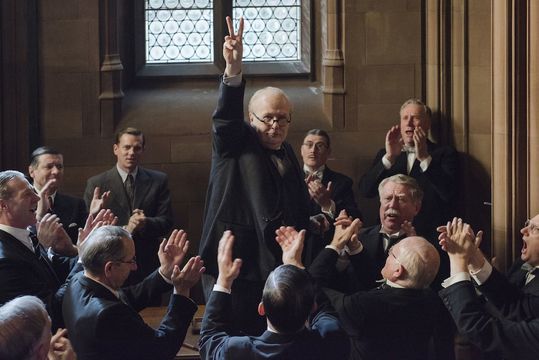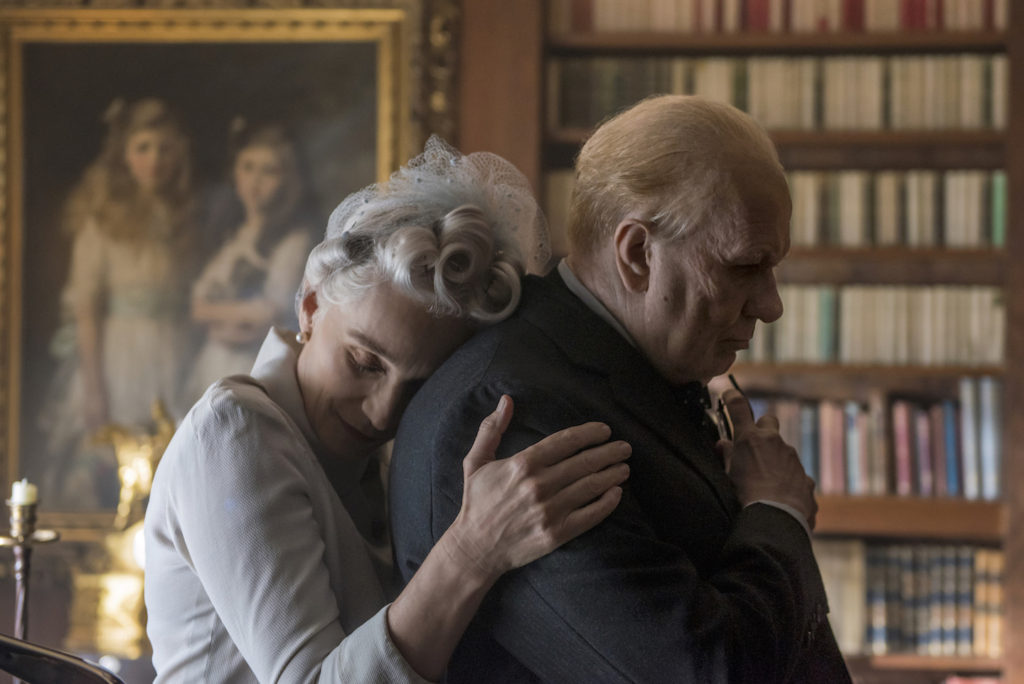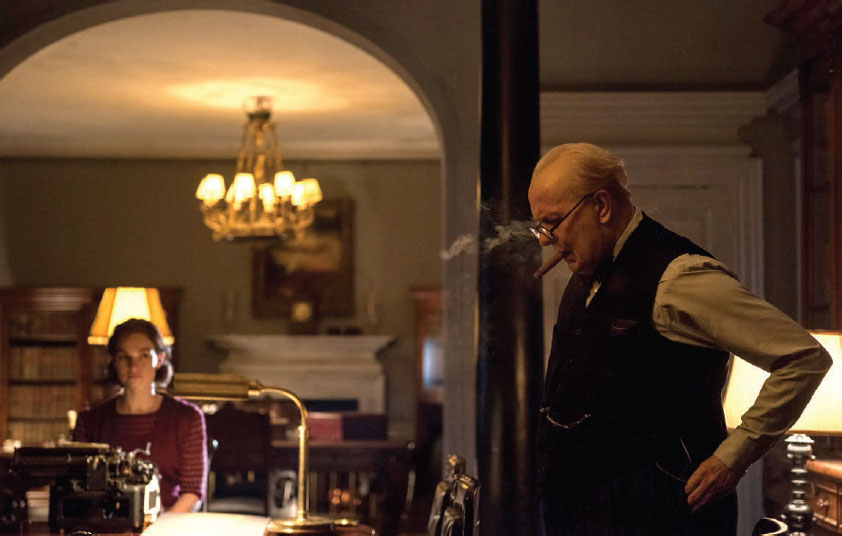
Gary Oldman as Winston Churchill in The Darkest Hour.
Not every Brit filmmaker would dare make a movie about “the greatest Briton”—Sir Winston Churchill himself. BHT asked Joe Wright—who has already beautifully adapted two of the finest British novels ever, Pride & Prejudice and Atonement— why he's drawn to another of his country's major touchstones.
The director speaks to BHT about Winston Churchill's world-saving speeches and what made the great man—surprisingly full of doubt—extraordinary.
Joe Wright's early beginnings
“I’m the child of immigrants,” the director says. “I’ve always been fascinated by where we ended up and I guess I’ve tried to understand the culture and country in which I was born. To understand where I am.”
Wright's parents came from South Africa to London, where they founded the Little Angel puppet theatre in Islington in 1959. “And it's been open since 1961, playing every Saturday and Sunday morning and afternoon ever since,” he cheerfully notes. Though he grew up with The Little Mermaid and Hansel and Gretel and other children's tales of good vs. evil, he is uncertain when I suggest Darkest Hour might fit within that moral framework.
“I'm not sure,” he says. “We do think of it, the Second World War, as having a clear right and wrong. Yes, it was a very moral war, but within that, there are vagueries as to the best policies to pursue within defeating the evil that was Hitler's racist regime.
“I guess what I’m trying to say is that I hope there are no goodies or baddies,” he clarifies—on the British side, he means.
To that end, with a more complex view, Wright wants to show Churchill, not just as the hero, but as a real person. “To take him down from that pedestal, really meet him face to face, eye to eye, and see who he was as a human being with warts and all,” he says. “Including his humor. People will be surprised at how funny the movie is, even though it's called Darkest Hour. You know, Churchill used humor as a tool to defend himself against his ‘black dog,’ really—the stresses of his position.”
Winston Churchill had a funny side
When asked to repeat his favorite Churchill joke, the very articulate Wright pauses, momentarily stumped. He even stammers a bit, until, almost sheepishly, he owns up to it. “Well, to be honest, it's when the lady at the party said to him, ‘Winston, you’re drunk!’ And he said, ‘Yes, Madam, and you are ugly, but in the morning I shall be sober.’” Crass and defensive, the joke is in keeping with Wright's point; there is nothing more human than lashing out after a few too many.
Still, as with almost all things Churchillian, even this rises above. Seventy years later, that exchange is still at the top of every list of History's Best Insults. Even in his cups, Churchill managed to be exceptional—which is the type of source material this director favors.
In one heart-wrenching, five-minute shot from Atonement, the camera travels the length of a beach to show men fighting, praying and despairing. They represent 300,000 soldiers waiting for rescue, including poor Robbie Turner (played by James McAvoy), who never made it home. “In a way, that was constantly playing in my mind [while filming Darkest Hour],” Wright says. “The mayhem, the horror, the grotesque of that scene underpinning the heroism and grand eloquence of Churchill's speech.”
One of Churchill's finest speeches
He is referring to the “We Shall Fight on the Beaches” speech of June 4, 1940. Delivered right after the Dunkirk evacuation, it was one of the three famed speeches during his first month as Prime Minister. These orations are at the heart of both the movie and Churchill's legacy. “It's an enormous privilege to film them.
You know, in any book of the greatest speeches of all time, one will find at least one, and often all three of them. And to think that he wrote them all in the course of one month, and the circumstances that propelled him to write such masterpieces…” Even now, Wright is moved. “It was a spine-tingling, ‘hair standing on end’ moment for all of us, I think…to finally stand up in Parliament with Gary Oldman as Churchill.”
Gary Oldman? Yes, you might find yourself surprised looking at the pictures. That really is Gary Oldman (Tinker Tailor Soldier Spy, Immortal Beloved). Even Wright was shocked by how thoroughly the actor disappeared into the role: “He would arrive ahead of everyone else and spend four hours in the makeup chair each morning, so he’d be there as Winston by the time I arrived. As I was leaving, he was getting back out of makeup, so I didn’t see ‘Gary’ for three months, and when I did finally see him at the wrap party, it was like, ‘Who are you?’”

Kristin Scott Thomas and Gary Oldman star as Clementine and Winston Churchill in director Joe Wright's DARKEST HOUR, a Focus Features release.<br /> Credit: Jack English / Focus Features
Gary Oldman's performance
Oldman's delivery of the famous speeches is extraordinary. “There were no recordings of Churchill's speeches to Parliament,” observes Michael F. Bishop, executive director of the International Churchill Society. “The recordings that exist were done by Churchill much later and lack the power and drama that his fellow MPs experienced and described. Gary Oldman has given that back to us.”
I ask Wright to go back to Churchill's first speech as Prime Minister: “Blood, Toil, Tears and Sweat,” delivered on May 13, 1940. “What we discover is that, actually, at the time, people weren’t supporting him. He spoke in the face of great ambivalence really towards him. We think of all these as being great triumphs, but people, certainly members of his own party, were very skeptical about him,” Wright says.
Churchill's relationship with America
Americans might take special notice of Churchill openly pleading with the States to join the fight. If Britain falls, he hopes “the New World, with all its power and might, steps forth to the rescue and the liberation of the old.”
“He said privately many times that his one goal, his one trump card, was to pull America into war. Everything he did was with one eye on America,” says Wright. But even his rhetorical gifts couldn’t get the United States to align with Britain. America wouldn’t join the fight until the attack on Pearl Harbor—a year and a half later.
Wright is forgiving of that American tardiness. “You have to consider that it was only 24 years since the First World War and the terrible loss of life and limb America suffered then. No one wanted to return to that horror,” he contextualizes generously. “I don’t consider it to be a lack of moral fiber or even initiative.”
Again, within the resistance to the Nazis, Wright finds complexity. “No goodies or baddies,” as he noted earlier. This doesn’t entirely correspond with the popular, commonly held beliefs: Neville Chamberlain as the weak appeaser, the one who would have negotiated with Hitler, and Churchill as the man of steel, who refused to concede, who never doubted.
“But Churchill did have his doubts,” Wright points out. “That is one of the things that actually made him such a great leader. He questioned himself. He questioned his own motives and his own judgement. That's important with leadership. Without that, there can be no real wisdom.”
“He was an incredibly flawed individual. He got a lot of things wrong in his life; at least in my opinion— [for example,] his policy on women's suffrage and Indian independence,” he continues.
Churchill's legacy
Even Wright's favorite Churchill quote reflects this for him. Unlike the joke, he knows it instantly: If you’re going through hell, keep going. “So many of his quotes are about keeping yourself up when things are hard. I think he experienced life as being quite hard a lot of the time, so I think he needed to write those lines for himself.” That line is usually interpreted as Churchill steeling others, inspiring courage, but Wright sees the vulnerability.
Wright finally drops the bomb. For those of you who are not WWII scholars, brace yourself. “There was a point where the prospects of the allies looked so bleak that he did consider making some kind of peace deal, and it's that moment of doubt, that moment of a crisis of confidence, that underpins this movie.”
Then, with this very human image of Winston Churchill taking shape, the director quickly and forcefully reminds me of the only thing that truly matters—the most important part of this epic story. “He made mistakes, but the one thing he got completely right in his life was his resistance to Hitler, Nazis, totalitarian regime, bigotry and hate.” That he saved this entire world as a flawed and doubting human being—rather than a man of steel—is even more impressive.
Wright hopes that Churchill continues to inspire, with our own era so in need of him. “We started making the movie in January 2016,” he says. “Since then, events across the world overtook us in a swell of topicality—and there's an extraordinary level of resistance now to those forces of bigotry.”
“I hope, and maybe I feel, that now this story of resistance is one that can also give us some optimism and energy to fight the forces of hate today,” he adds. Let us pray that he's right, and that perhaps Winston Churchill can save the world one more time.

Read more
* Originally published in 2017.





Comments